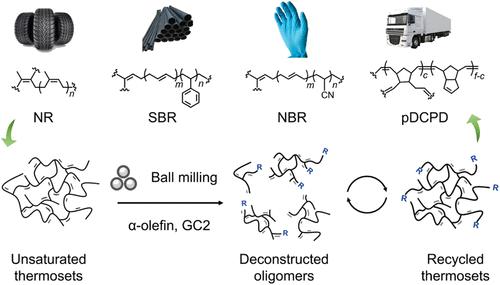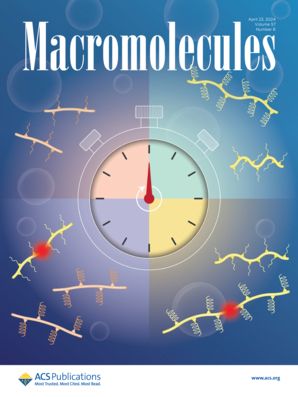工业不饱和热固性塑料和橡胶非变质回收的机械加速化学分解
IF 5.2
1区 化学
Q1 POLYMER SCIENCE
引用次数: 0
摘要
聚合物的解构和回收对于解决日益增长的废物积累和环境污染的挑战至关重要。含碳-碳双键的聚合物网络,从橡胶到塑料,年产量超过3000万吨,由于其永久交联结构,对化学解构和回收提出了重大挑战。在此,我们提出了一个结合物理裂解和烯烃分解的机械化学平台,以有效地解构各种工业不饱和热固性和橡胶。这种方法克服了网络稳定性的限制,通过使用市售α-烯烃作为链转移剂,通过ru催化的复分解反应,实现了聚合物网络的快速和完全的分解。此外,使用工业热固性材料(例如,聚双环戊二烯)作为模型系统,我们证明了解构的低聚物能够闭环回收,产生具有保留机械和热性能的回收热固性材料。此外,功能化烯烃链转移剂允许将解构产品升级为增值材料,如强粘合剂。这项工作不仅为解构高交联聚合物网络提供了一种有效的方法,而且为解决聚合物废物和环境污染问题提供了一种解决方案。本文章由计算机程序翻译,如有差异,请以英文原文为准。

Mechanically Accelerated Chemical Deconstruction for Nondeteriorative Recycling of Industrial Unsaturated Thermosets and Rubbers
The deconstruction and recycling of polymers are essential for addressing the ever-growing challenges of waste accumulation and environmental pollution. Carbon–carbon double bond containing polymer networks, ranging from rubbers to plastics, with an annual production exceeding 30 million tons, present a substantial challenge for chemical deconstruction and recycling due to their permanent cross-linked structures. Herein, we present a mechanochemical platform combining physical fragmentation with olefin metathesis to efficiently deconstruct various industrial unsaturated thermosets and rubbers. This approach overcomes network stability limitations by enabling the rapid and complete deconstruction of polymer networks through Ru-catalyzed metathesis reactions using commercially available α-olefins as chain transfer agents. Furthermore, using the industrial thermosets (e.g., polydicyclopentadiene) as a model system, we demonstrate that the deconstructed oligomers enable closed-loop recycling, yielding recycled thermosets with preserved mechanical and thermal properties. Additionally, functionalized olefin chain transfer agents allow for the upcycling of deconstructed products into value-added materials, such as strong adhesives. This work not only provides an efficient approach for deconstructing highly cross-linked polymer networks but also offers a solution for addressing the polymer waste and environmental pollution problems.
求助全文
通过发布文献求助,成功后即可免费获取论文全文。
去求助
来源期刊

Macromolecules
工程技术-高分子科学
CiteScore
9.30
自引率
16.40%
发文量
942
审稿时长
2 months
期刊介绍:
Macromolecules publishes original, fundamental, and impactful research on all aspects of polymer science. Topics of interest include synthesis (e.g., controlled polymerizations, polymerization catalysis, post polymerization modification, new monomer structures and polymer architectures, and polymerization mechanisms/kinetics analysis); phase behavior, thermodynamics, dynamic, and ordering/disordering phenomena (e.g., self-assembly, gelation, crystallization, solution/melt/solid-state characteristics); structure and properties (e.g., mechanical and rheological properties, surface/interfacial characteristics, electronic and transport properties); new state of the art characterization (e.g., spectroscopy, scattering, microscopy, rheology), simulation (e.g., Monte Carlo, molecular dynamics, multi-scale/coarse-grained modeling), and theoretical methods. Renewable/sustainable polymers, polymer networks, responsive polymers, electro-, magneto- and opto-active macromolecules, inorganic polymers, charge-transporting polymers (ion-containing, semiconducting, and conducting), nanostructured polymers, and polymer composites are also of interest. Typical papers published in Macromolecules showcase important and innovative concepts, experimental methods/observations, and theoretical/computational approaches that demonstrate a fundamental advance in the understanding of polymers.
 求助内容:
求助内容: 应助结果提醒方式:
应助结果提醒方式:


